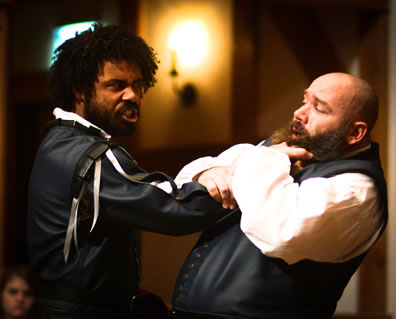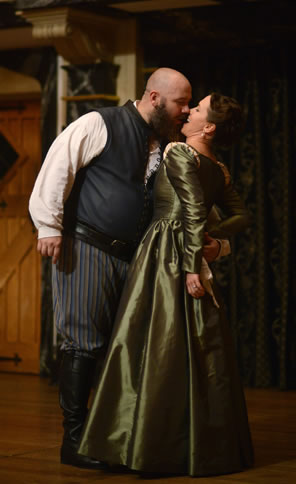Othello
The Road to Perdition Is a Matter of Trust
American Shakespeare Center, Blackfriars Playhouse, Staunton, Va.
Saturday, September 7, 2013, C-6&7 (center stalls)
Directed by Jim Warren
She was shedding real tears, her restrained sniffles finally giving way to a flood. Nearby, another woman stared, her face ashen as the blood drained except for the lines of red forming at the edges of her eyes. The rest was silence—in the audience. Desdemona and Emilia lay dead, Othello was perplexed in the extreme, and Iago snickered. When a production of William Shakespeare's Othello attains this level of intensity in the audience, it has succeeded.

Othello (Fernando Lamberty) in the grip of his jealous rage attacks Iago (Rick Blunt) in the American Shakespeare Center's production of Othello for the World's Mine Oyster Tour. Below, Emilia (Bridget Rue) holds back the handkerchief from her husband. Photos by Pat Jarrett, American Shakespeare Center.
This Othello is hitting the road as part of the American Shakespeare Center's World's Mine Oyster Tour, and for the company's 25th anniversary season, it has chosen to tour three plays—a history, a comedy, and this tragedy—featuring two of Shakespeare's most iconic figures, Falstaff and Iago, played by the touring troupe's most iconic actor, Rick Blunt. The boisterously gregarious Blunt, a midway barker for the carnival of life, tends to bring much of himself to his roles, and he does so with Iago, who clearly enjoys what he's doing to the other characters in the play. Yet, Blunt is a good actor, able to play roles as diverse as Don Armado and Banquo, and his Iago is as much a performer in the world of Othello as Blunt is on all the world's stages.
His Iago is certainly the centerpiece of this Othello, but in close orbit are performances by Patrick Midgley as Roderigo and Bridget Rue as Emilia. And the real star of this production is Shakespeare's play itself. This is the second time in three years that Jim Warren has directed Othello for ASC, and you would think that his being a text-centric, non-conceptual director of Shakespeare, you would get the equivalent of a rerun or, at least, a remounting. But Warren understands how Shakespeare's texts are living, breathing things that mature with the director's own enhanced experience and bend to the personalities of the actors playing them. While characteristics of this Othello are the same as that of Warren's 2010 production—namely, he retains the Clown and maintains the play's humorous vein—it is a subtly but notably different take on the drama.
That becomes apparent with the opening scene, the most electric I've witnessed in the 10 stagings of Othello I've seen. "Electric" is a totally figurative term here, by the way, because ASC, in replicating Shakespeare's staging conditions of the original Blackfriars, uses no sets or lighting effects, so this nighttime scene plays with the stage and audience bathed in chandelier light. It's the actors—Blunt, Midgley, and David Millstone as Brabantio—through their actions and lines that illuminate us with the scene's darkness. In this scene, Blunt finds his Iago's personality on the structure and tenor of the text. Although Iago and Roderigo come on stage expressly talking about Othello, we don't get any specific mention of the man until the 32nd line with "And I—God bless the mark!—his Moorship's ensign." Iago is clearly obsessed with his lack of promotion rather than the subject that obsesses Roderigo, Desdemona and the news that she is married to Othello. Another 30-plus lines will pass before Iago finally returns to Roderigo's concerns (and then he does so only for his own purposes) by telling the young lord to "Call up her father."
This scene's dialogue not only establishes Iago's consuming jealousy of both Othello and Cassio, it also gives Midgley the reading of his Roderigo, a young, upper-class scion, sheltered in the ways of the world who somehow has glommed onto Iago as his passage to romance and society. Midgley is comic in the playing of Roderigo's naïveté, but he never crosses the line into clowning, and his deft touches with Roderigo are revealing. His waking of Brabantio is tentative, so Iago standing in the shadows launches a cannon fire of bellicose warnings to not only raise up Brabantio but raise his ire—an ire first directed at Roderigo. "Most reverend signior, do you know my voice?" Midgley says with equal measure of respect and peacock pride. "My name is Roderigo." "The worser welcome," Brabantio replies, and as he continues to deride Roderigo, Midgley appears crestfallen. He tries to assuage Brabantio's anger with polite interjections before Iago intervenes again, issuing more belligerently lewd descriptions of Brabantio's daughter and the Moor "now making the beast with two backs." Midgley's Roderigo, like a quick-study acolyte, picks up on Iago's style, if not his volume and gutter quality, and describes to Brabantio how his daughter has gone to "the gross clasps of a lascivious Moor," then looks to Iago for approval.
The interplay of this scene—the contrast between Iago's crude and concise commentary and Roderigo's more respectful and word-heavy verse—matches up with that of another key scene, the Venetians' arrival on Cyprus. Desdemona goads Iago into his rather rude wit play about praising women's virtue, and this now-arcane comic set piece is played out in full in this production. Desdemona, played with winning charm by Stephanie Holladay Earl, clearly gives her reason for Iago's stand-up routine: "I am not merry, but I do beguile the thing I am by seeming otherwise," she tells Iago in confidence. Earl's Desdemona is not naive so much as she is playful, displaying a zest for life and love she wants to share with everyone around her. This ends up being her motivation for pressing Cassio's suit to Othello, thinking that reconciliation between the general (Fernando Lamberty) and his lieutenant (Patrick Earl) would ultimately bring peace to her husband. In this first Cyprus scene with Desdemona playing straight man to Iago's jests, we see the two making a great team, their humorous bents and gregarious ways conjoined. So, if you know what's coming, you are already feeling the tragedy stinging your heart.
Upon Othello's arrival, the general and Desdemona so dote on each other that Othello doesn't realize Cassio and Iago are standing at attention, saluting. And in the background, Roderigo watches everything, crooked in posture like a weepy little boy trying to pose for a picture he doesn't want to be part of, his face running the gamut of emotions from puzzled to disappointed to despair. Sometimes, watching a character watching the others on stage is the most revealing part of a scene, and Midgley makes it so here.
Another key piece of this production's emotional puzzle comes in the drunk Cassio scene. "The lieutenant is to be saved before the ensign," Cassio cracks belittlingly to Iago, and Blunt looks out knowingly toward the audience. We empathize with his sense of hurt, and we endorse his jealousy. We like this Iago: he's fun in a loud, rude kind of way, and we even get a kick out of his scamming the foolish Roderigo. Of all the characters on the stage, Iago is the one we most identify with through this point.
The final piece of the plot's puzzle comes with Emilia giving Desdemona's handkerchief to Iago, and this is not played with any psychosis concerning the marriage of this couple. Rue's Emilia is a perfect match for Iago, a competent woman with a bawdy side, saying of men that "They are all but stomachs, and we all but food; To eat us hungerly, and when they are full, they belch us." When she later tells Desdemona that she would cuckold her husband "for all the world," we sense she might do it for a little bit less, too—and maybe, just maybe, she had done so with Othello to help her husband attain the lieutenancy he craved so much. Their marriage has long ago evolved from romanticism to pragmatism, and Emilia gives Iago Desdemona's handkerchief simply because he wants it.
 The play's plot lines and the production's emotional lines thus established, we move into the tear- and ashen-face-inducing grip of the final act, starting with Iago killing Roderigo. Over the course of the play Midgley has subtly shifted our empathy from Iago to his Roderigo—the bottom line is that more of us identify with the duped than the duper—and his shocked response to Iago's suddenly clear duplicity strikes home; but too late. Even as the final catastrophe is unfolding in both the Cyprus alley and Desdemona's bedchamber, we realize that Emilia is yet clueless of what her husband has already wrought. Shakespeare cleverly puts her right in the middle of all the action, arriving on the scene after Roderigo's attack on Cassio, where she even berates Bianca (Emily Joshi-Powell), which Rue does with an unfair fierceness befitting Emilia's sense of class distinction. Emilia then arrives on the scene of Othello's murdering Desdemona.
The play's plot lines and the production's emotional lines thus established, we move into the tear- and ashen-face-inducing grip of the final act, starting with Iago killing Roderigo. Over the course of the play Midgley has subtly shifted our empathy from Iago to his Roderigo—the bottom line is that more of us identify with the duped than the duper—and his shocked response to Iago's suddenly clear duplicity strikes home; but too late. Even as the final catastrophe is unfolding in both the Cyprus alley and Desdemona's bedchamber, we realize that Emilia is yet clueless of what her husband has already wrought. Shakespeare cleverly puts her right in the middle of all the action, arriving on the scene after Roderigo's attack on Cassio, where she even berates Bianca (Emily Joshi-Powell), which Rue does with an unfair fierceness befitting Emilia's sense of class distinction. Emilia then arrives on the scene of Othello's murdering Desdemona.
As distraught as Emelia is at Othello's deed, she cannot comprehend that her husband's lie led to it. "My husband?" she says four times in disbelief. When Iago arrives, Rue puts all her force into Emilia's command to him to "Disprove this villain if thou beest a man," and when Iago does not, Rue roars the line "You told a lie, an odious, damned lie," piercing our hearts. Her pitch goes even higher when she hears that the handkerchief was Othello's key piece of evidence, and Rue makes clear that Emilia has hit the abyss of life. Her death, laid beside her lady, is her only way out.
Leaving us with Othello's final tragedy. Lamberty plays Othello as the warrior Moor, not a poetic one. He is efficient from start to the murdering of his wife, even as he succumbs to a jealous fervor. But at the end, when "chaos is come," he appears, truly, "perplexed in the extreme." It's a sharp turnabout for anybody to go from thinking that your wife has cheated on you to discovering that your most trusted friend has duped you into thinking so, and Lamberty displays how much harder such a turnabout is for someone of Othello's mentality, a warrior thriving in a world that hitherto has been black and white. This production offers no psycho-social context of the story, for Shakespeare really gives us none: Othello is, simply, the tragedy of a man who "loved not wisely but too well."
That line has always been taken to mean Desdemona; but does it not more accurately refer to Iago? Had Othello loved his wife wisely and too well, perdition would have never taken his soul. Instead, he put all his faith and respect—his love—in Iago, who has every reason to snicker at what he has accomplished.
Eric Minton
September 19, 2013
Comment: e-mail editorial@shakespeareances.com
Start a discussion in the Bardroom




 Find additional Shakespeareances
Find additional Shakespeareances